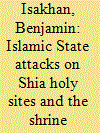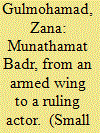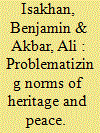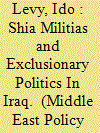|
|
|
Sort Order |
|
|
|
Items / Page
|
|
|
|
|
|
|
| Srl | Item |
| 1 |
ID:
172197


|
|
|
|
|
| Summary/Abstract |
After conquering large swaths of Syria and Iraq, the IS undertook an aggressive sectarian campaign in which they not only enacted horrific violence against the Shia people, but also damaged or destroyed several key Shia mosques and shrines. Drawing on Social Movement Theory (SMT), this article analyzes the response by various Shia non-state actors—militia leaders, religious clergymen, populist preachers, and seminal poets. It argues that they used the IS threat to Shia holy sites to develop and deploy a mobilization frame that has come to be referred to as the “shrine protection narrative.” The article also documents the manifold consequences of the shrine protection narrative: it underpinned a mass recruitment drive that saw tens of thousands enlist; it legitimized foreign Shia militias to enter the conflicts in both Syria and Iraq; it justified the formation of entirely new militias who declared the centrality of shrine protection to their mandate; and it mobilized them to enact political violence. In doing so, this article extends existing studies of SMT to demonstrate that “sacred spaces”—and particularly the need to protect religious sites from specific threats—can serve as a powerful mobilization frame towards political violence.
|
|
|
|
|
|
|
|
|
|
|
|
|
|
|
|
| 2 |
ID:
188327


|
|
|
|
|
| Summary/Abstract |
Badr has become a key Shia socio-political-armed organisation in Iraq and has revamped its political and organisational structure. Previously, it was an Iran based and designed Iraqi Shia opposition force, the armed wing of the Supreme Council for the Islamic Revolution in Iraq. Post-2003 it transformed into an incohesive political organisation with an armed wing and engaged in electoral politics. Badr has influenced the state’s apparatus and played a key role in the Popular Mobilisation Forces’ campaign against the Islamic State in Iraq. Primary resources, including interviews, Badr’s media and platforms and publications explain Badr’s approaches and decentralised structure.
|
|
|
|
|
|
|
|
|
|
|
|
|
|
|
|
| 3 |
ID:
188708


|
|
|
|
|
| Summary/Abstract |
The destruction of heritage in conflict has emerged as a key challenge to global security and the prospects of peace. In response to the deliberate targeting of heritage sites by the Islamic State (IS) and other actors in recent years, the international community has launched a number of initiatives designed to protect and reconstruct key heritage sites in complex (post-)conflict contexts. However, this article demonstrates that such initiatives are often underpinned by the norm that the protection of heritage in conflict can serve to enhance the prospects of reconciliation, stability and peace. This article problematizes this norm by focussing on the case study of Shia responses to the targeting of their religious heritage sites by the IS in Iraq from mid-2014. It documents the ways that key Shia leaders instrumentalized the case of protecting heritage not to advance peace and security, but to create entirely new militias, to recruit thousands of Shia faithful, to mobilize them to fight against the IS, and to engage in violence and human rights abuses. This raises significant concerns about whether the promotion of heritage as a pathway to peace could inadvertently exacerbate conflict and lead to renewed waves of violence and heritage destruction.
|
|
|
|
|
|
|
|
|
|
|
|
|
|
|
|
| 4 |
ID:
169608


|
|
|
|
|
| Summary/Abstract |
Following the May 12, 2018, parliamentary elections in Iraq, the lists of two prominent militia heads have emerged victorious. The Saairoon Alliance came in first, with 54 of the 329 seats, while the Fatah Alliance took second, with 47. Muqtada as‐Sadr, the Shia cleric and leader of the militia Saraya as‐Salam, and Hadi al‐Amiri, commander of the Badr Organization, head Saairoon and Fatah, respectively.1 These results reflect the widespread support the militias of al‐Hashd ash‐Shaabi, the Popular Mobilization Units (PMUs), have accumulated in their efforts against the Islamic State (IS) terrorist organization. Some PMUs want to assist the military in restoring the government's full control over Iraqi territory and even be incorporated into the military and police. Others receive support from Iran and openly proclaim loyalty to its supreme leader.
|
|
|
|
|
|
|
|
|
|
|
|
|
|
|
|
|
|
|
|
|